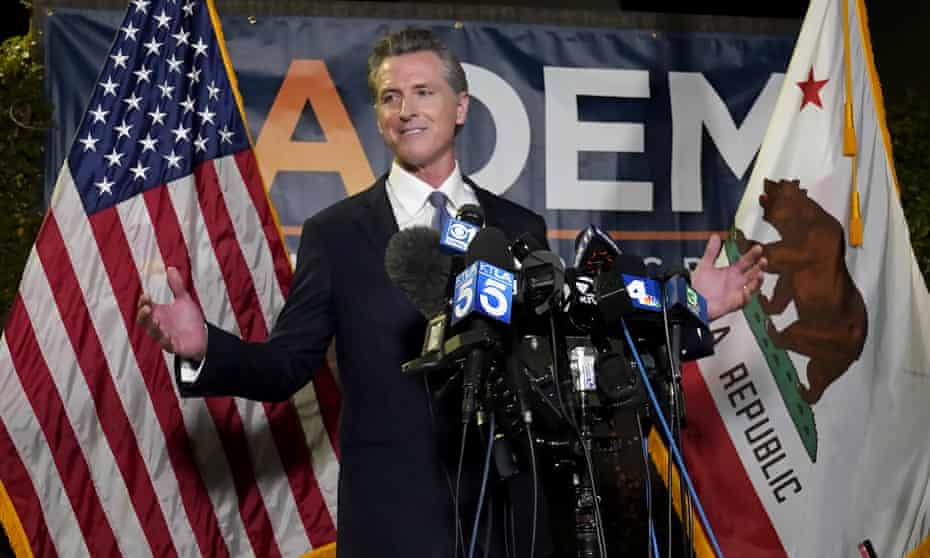California recall vote shows Trump’s big lie is now Republican playbook
It was a pre-emptive strike against truth by some of the biggest names on the American right wing.
Former president Donald Trump warned that the ballot would be “rigged”. The Republican candidate Larry Elder predicted “shenanigans”. The conservative media star Tomi Lahren suggested that “voter fraud” was inevitable.
The attempt to sow distrust in California’s recall effort began well before the Democratic governor, Gavin Newsom, scored a crushing victory on Tuesday, thwarting Elder and other Republicans who hoped to replace him.
The barrage of mendacious claims echoed Trump’s “big lie” of a stolen presidential election and were equally baseless. But, crucially, they also demonstrated that undermining faith in election integrity has become normalized as a strategy for many Republicans facing defeat at the ballot box.
“We saw it in the November election; we saw it in the January 6th insurrection,” Sean Clegg, a Newsom aide, told reporters this week. “We do not have a Democratic and Republican party in this country. We have a democratic party and an anti-democratic party.”
He added: “They’re trying to throw battery acid on our constitution, on our electoral norms, and it’s a preview of coming attractions. We’re going to see the same thing in 2022 and the same thing in 2024. And unfortunately, it’s become the Trump playbook and they’re going to it. And they’re going back to it.”
Although Democrats outnumber Republicans nearly two-to-one in California, party leaders had feared that Newsom could be vulnerable to a recall over his handling of the coronavirus pandemic, including mask and vaccine mandates.
Talk radio host Elder was the leading contender among 46 on the replacement ballot – which also included the reality TV star and former Olympian Caitlyn Jenner – and would almost certainly have become governor had the recall succeeded.
But as opinion polls showed Newsom in a commanding position, Republicans pushed the circular argument that they could only lose if the vote was rigged. Much of the Republican scaremongering focused on the wide use of mail-in ballots – even though an overwhelming majority of Californians cast ballots by mail before the pandemic without irregularities.
Elder said he believed “there might very well be shenanigans, as there were in the 2020 election”. A website affiliated with his campaign carried a link to a “Stop CA Fraud” site where people could report suspicious voting activity or sign a petition demanding a special legislative session to investigate. Some of the language was identical to a petition circulated to help Trump’s effort to overturn last year’s presidential election.
Trump himself weighed in during the closing days of the campaign, including a statement that asked rhetorically: “Does anybody really believe the California Recall Election isn’t rigged?”

The unfounded allegations seeped into the rightwing media ecosystem. Lahren, a host on the Fox Nation channel, opined: “The only thing that will save Gavin Newsom is voter fraud, so as they say: stay woke. Pay attention to the voter fraud going on in California because it’s going to have big consequences not only for that state but for upcoming elections.”
But the conspiracy theories were blunted by the scale of Newsom’s victory thanks to healthy turnout, support for his Covid-19 measures and a sweeping rejection of Trump-style populism. In the end even Elder did not mention fraud when he addressed his supporters after losing, pleading: “Let’s be gracious in defeat.”
Trump, however, called it “totally rigged” and rightwing media was notably reluctant to acknowledge the outcome. In a Twitter thread Brian Stelter, CNN’s chief media correspondent, noted that the pro-Trump One America News Network (OANN) spent hours talking about the recall while dancing around the fact that Newsom won.
“It’s just strange,” Stelter tweeted. “OAN is not alleging fraud but is totally ignoring the news.” Eventually, 12 hours after Newsom’s win had been widely projected, OANN briefly mentioned that the recall “secured Gavin Newsom’s role as California’s governor”.
A tighter race could have turned uglier. Joe Walsh, a former Republican congressman from Illinois, said: “It’s a damn good thing the California election wasn’t close at all because Larry Elder and Donald Trump and every other Republican signalled that if the election were going to be close, it was all going to be because of voter fraud.
“This is the Republican party playbook. It’s going to be hard to find, moving forward, any Republican candidate who loses and accepts the results of his or her election. They’re all going to be a big sore loser like Trump.”
Walsh, who challenged Trump for the Republican presidential nomination last year, added: “To be a viable Republican today, you have to lie or you have to deny the truth. You cannot say that Joe Biden won fair and square. You cannot say that January 6th was an insurrection. You’ve got to be careful saying the vaccines work.
“To be a Republican today, you’ve got to pretty much call into question every single election that you lose. This is Trump’s legacy and you’re going to see it again big time in 2024.”
But relentlessly trashing the electoral process could prove counterproductive. Last year Republicans feared that Trump’s claims about widespread fraud due to an expansion of mail-in voting during the pandemic would persuade many Republicans to stay at home. His constant crying foul in Georgia may have cost Kelly Loeffler and David Perdue their seats in a Senate runoff last January.
Drexel Heard, a Democratic strategist based in Los Angeles, said of the California recall: “You’ve got Republican strategists here now complaining the language the Republicans had been using, and certainly Donald Trump had been using, might have had an effect in suppressing Republican turnout in certain areas. Orange county, which was red in the last election, voted no on this recall.”
He added: “It’s almost like self-sabotaging. The more that they keep talking about election rigging, it’s not going to affect Democrats, it’s going to affect their voters, because why would their voters want to go out if they believe that their vote is not going to count? What Democrats have said is that we want everybody to vote, no matter whether it’s Democrat or Republican.”
Trump’s allies have more insidious lines of attack, however. Although state officials, judges and the then attorney general, William Barr, found no significant flaws in the 2020 election, some of the Republicans who sought to overturn it are now vying for positions of power over the way future elections are run in swing states.
With Trump’s backing, they are running to become secretaries of state – a position that can be vital in deciding questions such as which names get removed from voter rolls, who receives a mail-in ballot and which technology is used to certify results.

Among them is Mark Finchem, who this week gained Trump’s endorsement for Arizona secretary of state. He has pushed QAnon conspiracy theories and attended the 6 January rally that culminated in a deadly insurrection at the US Capitol. Trump praised Finchem for his “incredibly powerful stance on the massive Voter Fraud that took place in the 2020 Presidential Election Scam”.
And on Thursday the 45th president threw his weight behind Matthew DePerno for attorney general of Michigan, stating that he “has been on the front lines pursuing fair and accurate elections, as he relentlessly fights to reveal the truth about the Nov. 3rd Presidential Election Scam”.
The “big lie” is also manifest in a farcical “audit” of the 2020 election in Arizona that is expected to deliver so-called findings this month. Republicans in Pennsylvania plan to hold hearings as part of an investigation into the poll, while the state senate in Texas has passed a bill enabling party officials to request reviews of election results.
Observers fear that this new Republican orthodoxy can only gnaw away at the foundations of democracy. Larry Jacobs, director of the Center for the Study of Politics and Governance at the University of Minnesota, said: “It’s going to be here for a long time now. It’s a shame because we may lose a good number of Americans from civic belief in the constitution and the electoral process regardless of who wins.
“I think that’s happening: it’s 20 to 30% of the electorate, almost all Republican. That’s not good and then when Democrats lose close races, you’ll find some number of Democrats who now think this is acceptable, so it’s a very damaging and corrosive pattern that’s now accelerating.”
Jacobs added: “Remember Democrats were saying similar things in 2016: a smaller number and the losing candidate quickly stepped forward and acknowledged the loss so it didn’t go as far as what Trump and Republicans have done. Nonetheless, there is this corrosive and worrisome pattern right across the parties of challenging the very foundation of American democracy, which is that elections decide.”

